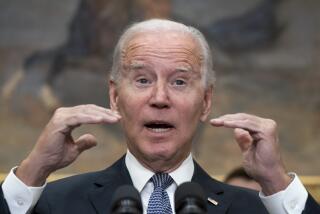Behold the Incredible Shrinking Deficit
- Share via
WASHINGTON — Remember the annual budget deficit--the fiscal scourge that politicians have warned would bankrupt our children, the flash point for endless partisan squabbling, the all-purpose symbol of a nation living beyond its means?
It’s getting smaller.
To the surprise of many budget watchers, the government’s red ink is now projected to total $144 billion next year. That’s a tidy sum to be sure, but--relative to the size of the economy--it is the smallest gap since the 1970s.
This week’s belated agreement on a spending bill to cover the remaining five months of the fiscal year has prompted new calls for President Clinton and congressional Republicans to tackle the bigger task of balancing the federal budget. Yet in an odd twist, the deficit’s near-term decline has made such an unusual election-year accord less likely than ever, political analysts said Thursday.
The diminishing deficit, combined with the severe price that Republicans already have paid for their controversial budget strategies, is “a recipe for very little substantive action to reduce the deficit in this election year,” said Kim Wallace, a political analyst with the Lehman Brothers investment firm in Washington.
Not that everybody is ready to believe that such an oft-lamented national woe as the federal deficit actually could be improving. To many Americans accustomed to a barrage of bad news on the deficit, the notion may be hard to accept.
“You run into a lot of resistance to the idea that the deficit is declining,” conceded Kurt E. Karl, an economist at the WEFA Group in suburban Philadelphia, which forecasts a 1996 deficit of $140 billion.
Nonetheless, Karl added, only slightly tongue in cheek, deficit-hating politicians may get their fondest wish without having to take any controversial positions. “If we just have gridlock for the next six years, we’ll have a balanced budget by 2002. They really don’t need to do much.”
What is going on? Economists and budget analysts point to a few forces that have reduced the red ink for now, although none alters the pessimistic outlook for the budget after the baby boom generation begins to retire in the next century.
For one, Congress and the White House actually have tightened up on spending in “discretionary areas” of the budget, affecting purchases by many agencies. June O’Neill, director of the Congressional Budget Office, testified last week that appropriations levels for 1996 were coming in at $20 billion less than had been expected.
Largely as a result, the CBO has trimmed $28 billion from its deficit projections and now forecasts $144 billion in red ink this year.
Other surprises came in health care expenses, which have lagged forecasts because of a pronounced drop in medical inflation.
“That’s important because Medicare and Medicaid are the fastest growing parts of the budget,” pointed out Bradley Schiller, an economist at American University in Washington.
In addition, deficit-cutting deals signed by George Bush in 1990 and Clinton in 1993, both of which included tax hikes, have stabilized the government’s books somewhat, pushing up revenue and adding to spending restraint.
Yet all of these things are overshadowed by the economy, which has been growing for most of the 1990s, thereby raising revenue and limiting the cost of such expenses as unemployment benefits. For each drop in the unemployment rate of a single percentage point, the deficit shrinks by $46 billion, Schiller estimated.
And the jobless rate has fallen by 1 1/2 percentage points since early 1993. The drop in the deficit “is almost completely explained by the unemployment rate,” he maintained.
It could be argued that a reduced deficit might inspire some politicians to try even harder to eliminate the red ink because the job is that much easier to achieve. Separately, some deficit hawks might say that these new statistics only distract from the more serious, long-term challenge, a possible explosion of the deficit in the next century, unless significant changes are made in health care programs for the elderly.
The betting Thursday was not on such arguments holding sway.
More to Read
Get the L.A. Times Politics newsletter
Deeply reported insights into legislation, politics and policy from Sacramento, Washington and beyond. In your inbox three times per week.
You may occasionally receive promotional content from the Los Angeles Times.










